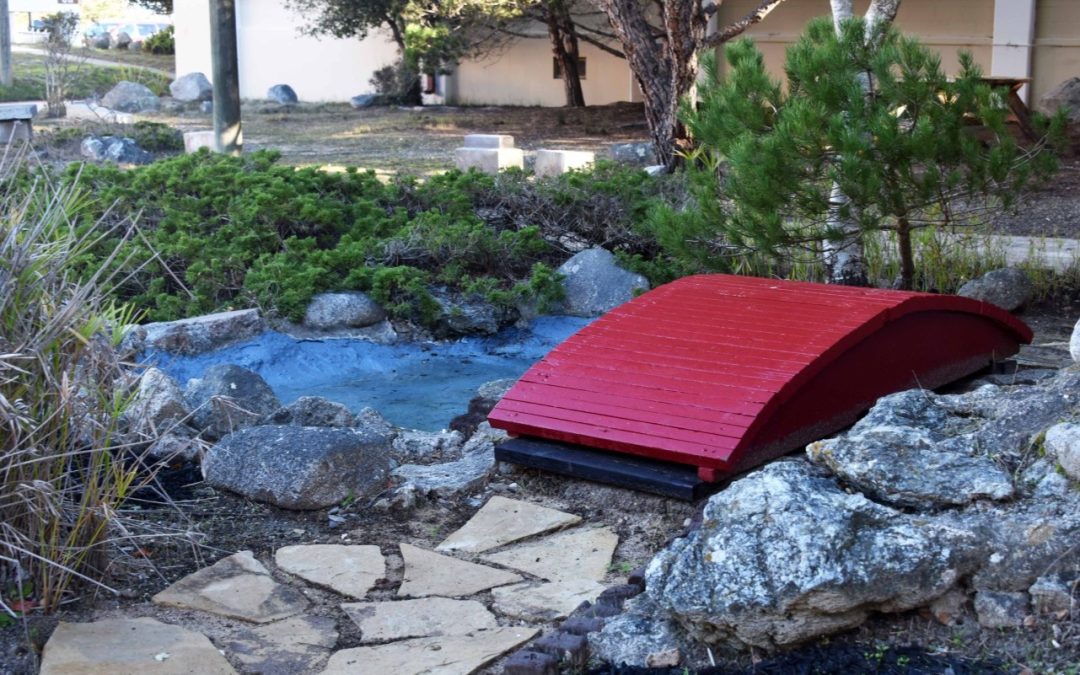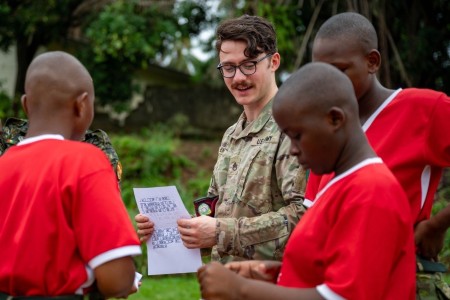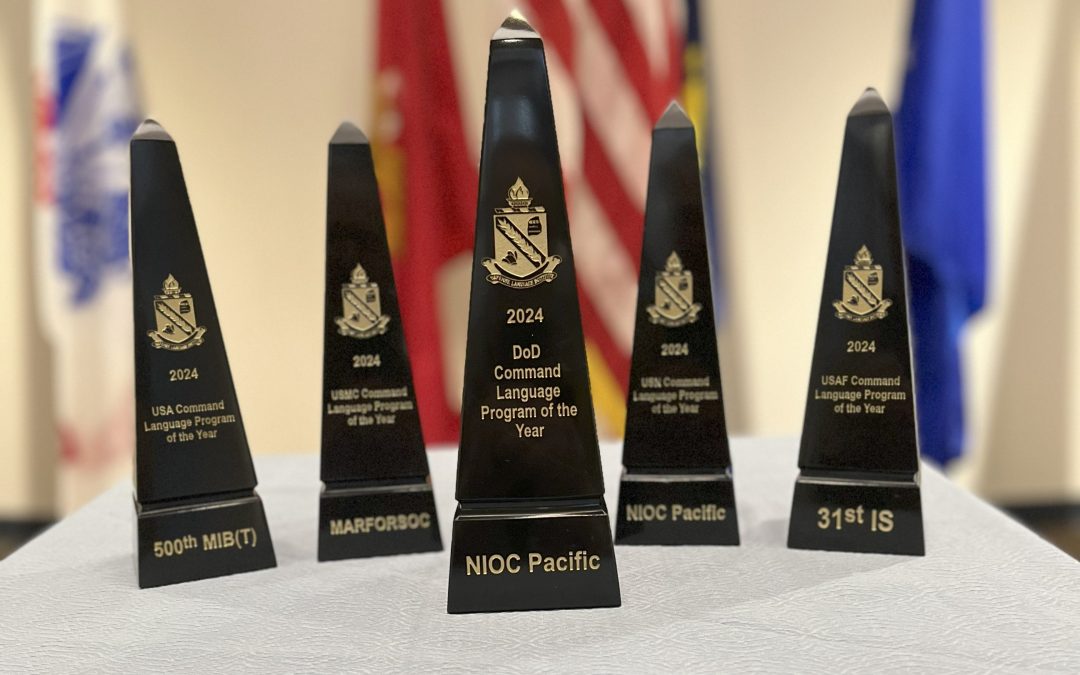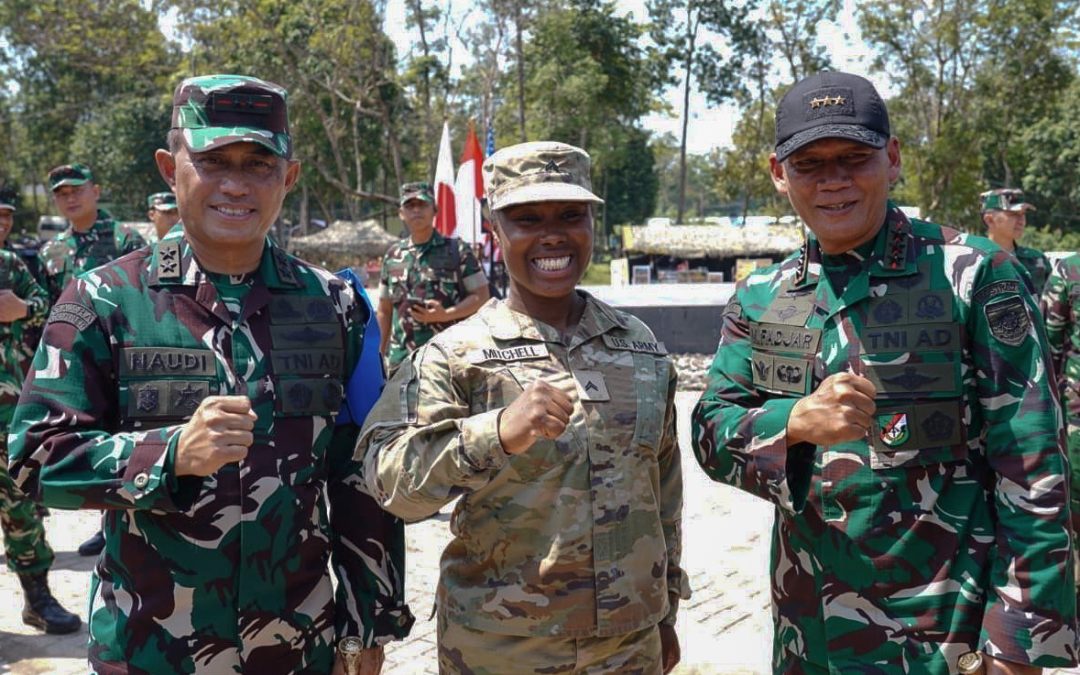By Patrick Bray
DLIFLC Public Affairs

Maj. Gen. James A. Adkins, a 1976 Defense Language Institute Foreign Language Center graduate in Russian, spoke to current Russian students at the institute’s European and Latin American School Oct. 23. (Photo by Patrick Bray, DLIFLC Public Affairs)
MONTEREY, Calif. – Maj. Gen. James A. Adkins, a 1976 Defense Language Institute Foreign Language Center graduate in Russian, spoke to current Russian students at the institute’s European and Latin American School Oct. 23.
Adkins retired from the Army National Guard as the 28th adjutant general of Maryland and served just four days short of 40 years. Throughout that time he says that his DLIFLC experience has influenced him for most of his career.
“Now, it’s hard to believe that it’s been 40 years since my class was here and (that I) sat where you are today. In October 1975, we would have been halfway through our Russian program. We experienced the same emotions that you no doubt are experiencing, from excitement to uncertainty, from frustration to fear, and we had a little fun along the way,” said Adkins.
Adkins spoke to an audience of about 200 students about his experience and personal stories from his time as a student. He emphasized the lasting friendships he made with several of his classmates who joined him on the visit, as he shared photographs from when they were students. He quoted his class leader, Staff Sgt. Al Kohler, who said he was born in Pennsylvania but learned to “live” at the school in Monterey.

Maj. Gen. James A. Adkins, a 1976 Defense Language Institute Foreign Language Center graduate in Russian, spoke to current Russian students at the institute’s European and Latin American School Oct. 23. He emphasized the lasting friendships he made with several of his classmates who joined him on the visit, as he shared photographs from when they were students. (Photo courtesy of Maj. Gen. James Adkins)
“As you see with our class, friendships and bonds formed here have lasted for decades,” said Adkins.
“Your experience here and DLIFLC will be a part of you for the rest of your life,” said Adkins. “In my case, DLIFLC was always at the core of my preparations for a career that took me from Afghanistan to Iraq, from Kuwait to Kosovo, from Cairo to the Sinai, from Bosnia and Herzegovina in the Balkans to Estonia in the Baltics, from stateside assignments to the Far East, and a lot of places in between.”
Adkins began his career as an enlisted Soldier and later became a commissioned officer serving in intelligence, infantry and cavalry assignments. He graduated from the U.S. Army Command and General Staff College and the U.S. Army War College.
“DLIFLC meant more to me than any other school I attended including the War College. It provided us with an understanding of language and culture that were instrumental to our success as Soldiers and civilians,” said Adkins.

Maj. Gen. James A. Adkins, a 1976 Defense Language Institute Foreign Language Center graduate in Russian, spoke to current Russian students at the institute’s European and Latin American School Oct. 23. (Photo courtesy of Maj. Gen. James Adkins)
“You never know when you will get an opportunity to use your language. In my case, there were little opportunities and big ones. From a park bench in San Antonio to the streets of East Berlin to a stranded vehicle in an East Coast blizzard, I had the opportunity to use my Russian. Be ready and use it,” said Adkins.
Adkins also warned students that the “Russian bear is once again stirring.”
“DLIFLC has no doubt seen an ebb and flow of emphasis on certain languages. I imagine today that Russian is on the rise as it was 40 years ago,” said Adkins.
Recently, Army Chief of Staff Gen. Mark A. Milley outlined goals for active duty and reserve components stating that with the draw down in the number of troops, he would be increasingly calling on the National Guard to potentially deter growing threats from Russia, China and North Korea.

Maj. Gen. James A. Adkins, a 1976 Defense Language Institute Foreign Language Center graduate in Russian, points to a photo of himself as a student. Adkins spoke to current Russian students at the institute’s European and Latin American School Oct. 23. (Photo by Patrick Bray, DLIFLC Public Affairs)
As a retired Army National Guard officer, Adkins asserts that the National Guard is already an essential component of the Army, especially with the State Partnership Program, which links a state’s National Guard with the armed forces of a partner country in a cooperative relationship.
“Since 9/11 the National Guard has been effectively deployed and these partnerships have only grown stronger,” said Adkins after his speech to the students.
As a Russian linguist, Adkins knows how important language and cultural understanding is in building a partnership.
“You can’t surge a partnership,” said Adkins as he continued about the program. When the time comes that these partnerships are needed to deter aggression or for any other reason, they are already established, he said.
As adjutant general of the Maryland Army National Guard, Adkins oversaw the state’s partnership with Estonia in the Baltics.

Maj. Gen. James A. Adkins, a 1976 Defense Language Institute Foreign Language Center graduate in Russian, spoke to current Russian students at the institute’s European and Latin American School Oct. 23. Adkins spoke to an audience of about 200 students about his experience and personal stories from his time as a student. (Photo by Patrick Bray, DLIFLC Public Affairs)
“Russian was valuable to me when I assisted the former Soviet Republic of Estonia in its transition out of what they called their occupation,” said Adkins.
“As you begin to apply your language skills in assignments after DLIFLC, you never know when you will be that service member at a critical time and place who will see something or hear something that saves the lives of fellow Americans or possibly change the course of history,” said Adkins.




